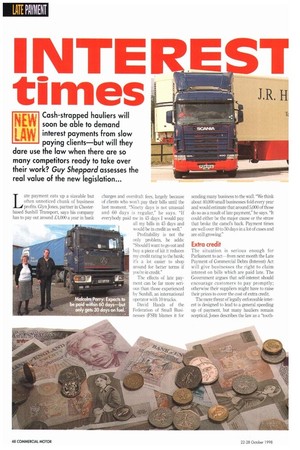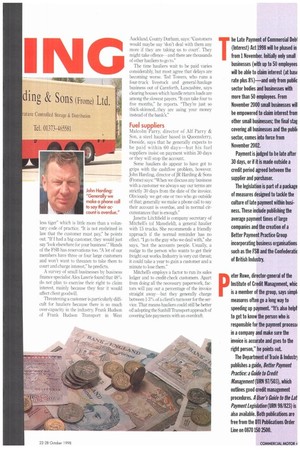Cash-strapped hauliers will soon be able to demand interest payments
Page 50

Page 51

If you've noticed an error in this article please click here to report it so we can fix it.
from slow paying clients—but will they dare use the law when there are so many competitors ready to take over their work? Guy Sheppard assesses the real value of the new legislation...
Late payment eats up a sizeable but often unnoticed chunk of business profits. Glyn Jones, partner in Chesterbased Sunhill Transport, says his company has to pay out around ,C4,000 a year in bank
charges and overdraft fees, largely because of clients who won't pay their bills until the last moment. "Ninety days is not unusual and 60 days is regular," he says. "If everybody paid me in 45 days I would pay all my bills in 45 days and would be in credit as well."
Profitability is not the only problem, he adds: "Should I want to go out and buy a piece of kit it reduces my credit rating to the bank; it's a lot easier to shop around for better terms if you're in credit."
The effects of late payment can be far more serious than those experienced by Sunhill, an international operator with 10 trucks.
David I-lands of the Federation of Small Businesses (FSB) blames it for
sending many business to the wall. "We think about 40,000 small businesses fold every year and would estimate that around 5,000 of those do so as a result of late payment," he says. "It could either be the major cause or the straw that broke the camel's back Payment times are well over 40 to 50 days in a lot of eases and are still growing."
Extra credit
The situation is serious enough for Parliament to act—from next month the Late Payment of Commercial Debts (Interest) Act will give businesses the right to claim interest on bills which are paid late. The Government argues that self-interest should encourage customers to pay promptly; otherwise their suppliers might have to raise their prices to cover the cost of extra credit.
The mere threat of legally enforceable interest is designed to lead to a general speeding up of payment, but many hauliers remain sceptical. Jones describes the law as a "tooth
less tiger" which is little more than a voluntary code of practice. it is not enshrined in law that the customer must pay: he points out. "If I had a big customer, they would just say 'look elsewhere for your business': Hands of the FSB has reservations too. "A lot of our members have three or four large customers and won't want to threaten to take them to court and charge interest," he predicts.
A survey of small businesses by business finance specialist Alex Lawrie found that 48% do not plan to exercise their right to claim interest, mainly because they fear it would affect client goodwill.
Threatening a customer is particularly difficult for hauliers because there is so much over-capacity in the industry Frank Hudson of Frank Hudson Transport in West Auckland, County Durham. says: "Customers would maybe say 'don't deal with them any more if they are taking us to court'. They might take offence—and there are thousands of other hauliers to go to."
The time hauliers wait to be paid varies considerably, but most agree that delays are becoming worse. Ted Towers, who runs a four-truck livestock and general-haulage business out of Carnforth. Lancashire, says clearing houses which handle return loads are among the slowest payers. it can take four to five months," he reports. "They're just so thick-skinned...they are using your money instead of the bank's."
Fuel suppliers
Malcolm Parry, director of All Parry & Son, a steel haulier based in Queensferry, Deeside, says that he generally expects to be paid within 60 days—but his fuel suppliers insist on payment within 30 days or they will stop the account.
Some hauliers do appear to have got to grips with the cashflow problem, however. John Harding, director ofJR1larding & Sons (Prom) says: 'When we discuss any business with a customer we always say our terms are strictly 30 days from the date of the invoice. Obviously we get one or two who go outside of that; generally we make a phone call to say their account is overdue, and in normal circumstances that is enough."
Janette Litchfield is company secretary of Mitchell's of Mansfield), a general haulier with 15 trucks. She recommends a friendly approach if the normal reminder has no effect"! go to the guy who we deal with," she says, "not the accounts people. Usually, a nudge to the person who wants to get their freight out works. Industry is very cut-throat; it could take a year to gain a customer and a minute to lose them."
Mitchell's employs a factor to run its sales ledger and to credit-check customers. Apart from doing all the necessary paperwork, factors will pay out a percentage of the invoice straight away—but they generally charge between 1-3% of a client's turnover for the service. That means hauliers could still be better off adopting the Sunhill Transport appmach of covering late payments with an overdraft.
The Late Payment of Commercial Debi (Interest) Act 1998 will be phased in from 1 November. Initially only small businesses (with up to 50 employees will be able to claim interest (at bast rate plus 8%)—and only from public sector bodies and businesses with more than 50 employees. From November 2000 small businesses will be empowered to claim interest from other small businesses; the final stag covering all businesses and the publii sector, comes into force from November 2002.
Payment is judged to be late after 30 days, or if it is made outside a credit period agreed between the supplier and purchaser.
The legislation is part of a package of measures designed to tackle the culture of late payment within business. These include publishing the average payment times of large companies and the creation of a Better Payment Practice Group incorporating business organisations such as the FSB and the Confederatic of British Industry.
peter Rowe, director-general of the Institute of Credit Management, whit is a member of the group, says simpl, measures often go a long way to speeding up payment "Its also helpf to get to know the person who is responsible for the payment processi in a company and make sure the invoice is accurate and goes to the right person," he points out.
The Department of Trade & Industn publishes a guide, Better Payment Practice: a Guide to Credit Management (URN 97/503), which outlines good credit management procedures. 4 User's Guide to the Lat Payment Legislation (URN 98/823) is also available. Both publications are free from the DTI Publications Order Line on 0870 150 2500.
















































































































